Related Research Articles
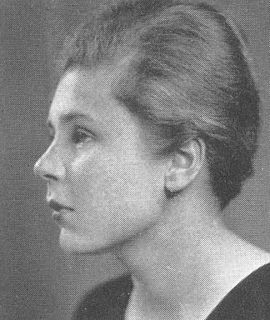
Elizabeth Bishop was an American poet and short-story writer. She was Consultant in Poetry to the Library of Congress from 1949 to 1950, the Pulitzer Prize winner for Poetry in 1956, the National Book Award winner in 1970, and the recipient of the Neustadt International Prize for Literature in 1976. Dwight Garner argued that she was perhaps "the most purely gifted poet of the 20th century".
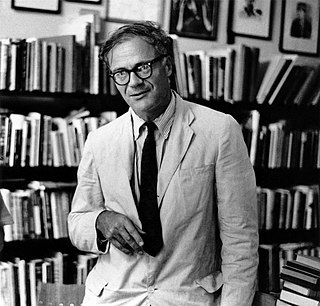
Robert Traill Spence Lowell IV was an American poet. He was born into a Boston Brahmin family that could trace its origins back to the Mayflower. His family, past and present, were important subjects in his poetry. Growing up in Boston also informed his poems, which were frequently set in Boston and the New England region. The literary scholar Paula Hayes believes that Lowell mythologized New England, particularly in his early work.
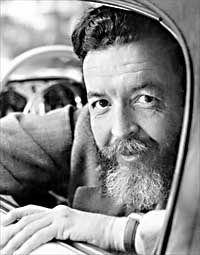
Randall Jarrelljə-REL was an American poet, literary critic, children's author, essayist, and novelist. He was the 11th Consultant in Poetry to the Library of Congress—a position that now bears the title Poet Laureate of the United States.
Frederick Seidel is an American poet.

Charles Kenneth "C. K." Williams was an American poet, critic and translator. Williams won many poetry awards. Flesh and Blood won the National Book Critics Circle Award in 1987. Repair (1999) won the 2000 Pulitzer Prize for Poetry, was a National Book Award finalist and won the Los Angeles Times Book Prize. The Singing won the 2003 National Book Award and Williams received the Ruth Lilly Poetry Prize in 2005. The 2012 film The Color of Time relates aspects of Williams' life using his poetry.
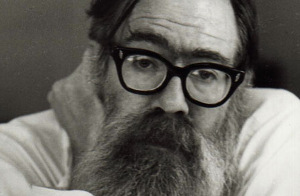
John Allyn McAlpin Berryman was an American poet and scholar. He was a major figure in American poetry in the second half of the 20th century and is considered a key figure in the "confessional" school of poetry. His best-known work is The Dream Songs.
'Skunk Hour' is one of Robert Lowell's most frequently anthologized poems. It was published in his groundbreaking book of poems, Life Studies, and is regarded as a key early example of Confessional poetry.
Gjertrud Schnackenberg is an American poet.

Carl Phillips is an American writer and poet. He is a Professor of English at Washington University in St. Louis.

Lewis Hyde is a scholar, essayist, translator, cultural critic and writer whose scholarly work focuses on the nature of imagination, creativity, and property.

Robert Giroux was an American book editor and publisher. Starting his editing career with Harcourt, Brace & Co., he was hired away to work for Roger W. Straus, Jr. at Farrar & Straus in 1955, where he became a partner and, eventually, its chairman. The firm was henceforth known as Farrar, Straus and Giroux, where he was known by his nickname, "Bob".
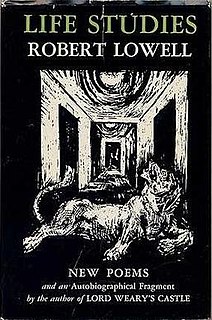
Life Studies is the fourth book of poems by Robert Lowell. Most critics consider it one of Lowell's most important books, and the Academy of American Poets named it one of their Groundbreaking Books. Helen Vendler called Life Studies Lowell's "most original book." It won the National Book Award for Poetry in 1960.

The Mills of the Kavanaughs is the third book of poems written by the American poet Robert Lowell. Like Lowell's previous book, Lord Weary's Castle, the poetry in Kavanaughs was also ornate, formal, dense, and metered. All of the poems are dramatic monologues, and the literary scholar Helen Vendler noted that the poems in this volume "were clearly influenced by Frost's narrative poems as well as by Browning."

Lord Weary's Castle, Robert Lowell's second book of poetry, won the Pulitzer Prize for Poetry in 1947 when Lowell was only thirty. Robert Giroux, who was the publisher of Lowell's wife at the time, Jean Stafford, also became Lowell's publisher after he saw the manuscript for Lord Weary's Castle and was very impressed; he later stated that Lord Weary's Castle was the most successful book of poems that he ever published.

Jonathan Galassi has served as the president and publisher of Farrar, Straus and Giroux and is currently the Chairman and Executive Editor.
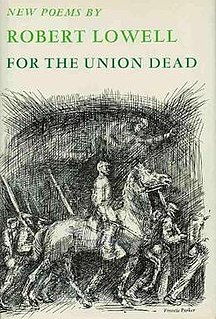
For the Union Dead is a book of poems by Robert Lowell that was published by Farrar, Straus & Giroux in 1964. It was Lowell's sixth book.
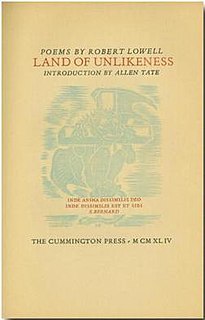
Land of Unlikeness, Robert Lowell's first book of poetry, was published in 1944 in a limited edition of two hundred and fifty copies by Harry Duncan at the Cummington Press. The poems were all metered, often rhymed, and very much informed by Lowell's recent conversion to Catholicism.
Saskia Hamilton is an American poet. She graduated from Kenyon College with a B.A., from New York University with an M.A., and from Boston University with Ph.D. She worked for the Folger Shakespeare Library, and the Lannan Foundation and now teaches at Barnard College. She was a judge for the 2009 Griffin Poetry Prize.

The Dream Songs is a compilation of two books of poetry, 77 Dream Songs (1964) and His Toy, His Dream, His Rest (1968), by the American poet John Berryman. According to Berryman's "Note" to The Dream Songs, "This volume combines 77 Dream Songs and His Toy, His Dream, His Rest, comprising Books I through VII of a poem whose working title, since 1955, has been The Dream Songs." In total, the work consists of 385 individual poems.
Eileen Simpson was an American writer and psychotherapist. Her 1982 book Poets in their Youth records her life with first husband John Berryman and his circle of poets, including Delmore Schwartz and Robert Lowell. In 1984 she was a recipient of a Guggenheim Fellowship for Creative Arts in General Nonfiction.
References
- ↑ Hamilton, Saskia. "Introduction: 'I Was Naked Without My Line-Ends.'" The Letters of Robert Lowell. New York: Farrar, Straus, & Giroux, 2004.
- 1 2 Voices and Visions Video Series. Robert Lowell. 1988.
- ↑ Lowell, Robert and John Berryman. Guggenheim Poetry Reading. New York: Academy of American Poets Archive, 1963. 88 minutes.
- ↑ Lowell, Robert (Summer 1953). "Beyond the Alps". Kenyon Review . 15 (3): 398–401. ISSN 0163-075X . Retrieved 9 August 2022.
- ↑ Lowell, Robert. Collected Poems. New York: Farrar, Straus, & Giroux. 2001.
- ↑ Lowell, Robert. Collected Poems. Eds. Frank Bidart and David Gewanter. New York: Farrar, Straus, & Giroux. 2001.